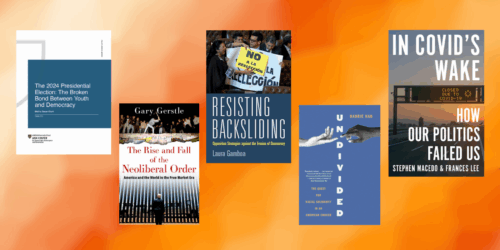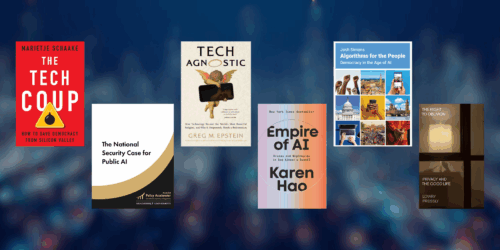Artificial intelligence will change so many aspects of society, largely in ways that we cannot conceive of yet. Democracy, and the systems of governance that surround it, will be no exception. In this short essay, I want to move beyond the “AI generated disinformation” trope and speculate on some of the ways AI will change how democracy functions – in both large and small ways.
When I survey how artificial intelligence might upend different aspects of modern society, democracy included, I look at four different dimensions of change: speed, scale, scope, and sophistication. Look for places where changes in degree result in changes of kind. Those are where the societal upheavals will happen.
Some items on my list are still speculative, but non require science-fictional levels of technological advance. And we can see the first stages of many of them today. When reading about the successes and failures of AI systems, it’s important to differentiate between the fundamental limitations of AI as a technology, and the practical limitations of AI systems in the fall of 2023. Advances are happening quickly, and the impossible is becoming the routine. We don’t know how long this will continue, but my bet is on continued major technological advances in the coming years. Which means it’s going to be a wild ride.
So, here’s my list:
1. AI as educator. We are already seeing AI serving the role of teacher. It’s much more effective for a student to learn a topic from an interactive AI chatbot than from a textbook. This has applications for democracy. We can imagine chatbots teaching citizens about different issues, such as climate change or tax policy. We can imagine candidates deploying chatbots of themselves, allowing voters to directly engage with them on various issues. A more general chatbot could know the positions of all the candidates, and help voters decide which best represents their position. There are a lot of possibilities here.
2. AI as sense maker. There are many areas of society where accurate summarization is important. Today, when constituents write to their legislator, those letters get put into two piles – one for and another against – and someone compares the height of those piles. AI can do much better. It can provide a rich summary of the comments. It can help figure out which are unique and which are form letters. It can highlight unique perspectives. This same system can also work for comments to different government agencies on rulemaking processes – and on documents generated during the discovery process in lawsuits.
3. AI as moderator, mediator, and consensus builder. Imagine online conversations, where AIs serve the role of moderator. It could ensure that all voices are heard. It could block hateful – or even just off-topic – comments. It could highlight areas of agreement and disagreement. It could help the group reach a decision. This is nothing that a human moderator can’t do, but there aren’t enough human moderators to go around. AI can give this capability to every decision-making group. At the extreme, an AI could be an arbiter – a judge – weighing evidence and making a decision. These capabilities don’t exist yet, but they are not far off.
4. AI as lawmaker. We have already seen proposed legislation written by AI, albeit more as a stunt than anything else. But in the future AIs will help craft legislation, dealing with the complex ways laws interact with each other. More importantly, AIs will eventually be able to craft loopholes in legislation, ones potentially too complicated for people to easily notice. On the other side of that, AIs could be used to find loopholes in legislation – for both existing and pending laws. And more generally, AIs could be used to help develop policy positions.
5. AI as political strategist. Right now, you can ask your favorite chatbot questions about political strategy: what legislations would further your political goals, what positions to publicly take, what campaign slogans to use. The answers you get won’t be very good, but that’ll improve with time. In the future we should expect politicians to make use of this AI expertise: not to follow blindly, but as another source of ideas. And as AIs become more capable at using tools, they can automatically conduct polls and focus groups to test out political ideas. There are a lot of possibilities here. AIs could also engage in fundraising campaigns, directly soliciting contributions from people.
6. AI as lawyer. We don’t yet know which aspects of the legal profession can be done by AIs, but many routine tasks that are now handled by attorneys will soon be able to be completed by an AI. Early attempts at having AIs write legal briefs haven’t worked, but this will change as the systems get better at accuracy. Additionally, AIs can help people navigate government systems: filling out forms, applying for services, contesting bureaucratic actions. And future AIs will be much better at writing legalese, reducing the cost of legal counsel.
7. AI as cheap reasoning generator. More generally, AI chatbots are really good at generating persuasive arguments. Today, writing out a persuasive argument takes time and effort, and our systems reflect that. We can easily imagine AIs conducting lobbying campaigns, generating and submitting comments on legislation and rulemaking. This also has applications for the legal system. For example: if it is suddenly easy to file thousands of court cases, this will overwhelm the courts. Solutions for this are hard. We could increase the cost of filing a court case, but that becomes a burden on the poor. The only solution might be another AI working for the court, dealing with the deluge of AI-filed cases – which doesn’t sound like a great idea.
8. AI as law enforcer. Automated systems already act as law enforcement in some areas: speed trap cameras are an obvious example. AI can take this kind of thing much further, automatically identifying people who cheat on tax returns or when applying for government services. This has the obvious problem of false positives, which could be hard to contest if the courts believe that “the computer is always right.” Separately, future laws might be so complicated that only AIs are able to decide whether or not they are being broken. And, like breathalyzers, defendants might not be allowed to know how they work.
9. AI as propagandist. AIs can produce and distribute propaganda faster than humans can. This is an obvious risk, but we don’t know how effective any of it will be. It makes disinformation campaigns easier, which means that more people will take advantage of them. But people will be more inured against the risks. More importantly, AI’s ability to summarize and understand text can enable much more effective censorship.
10. AI as political proxy. Finally, we can imagine an AI voting on behalf of individuals. A voter could feed an AI their social, economic, and political preferences; or it can infer them by listening to them talk and watching their actions. And then it could be empowered to vote on their behalf, either for others who would represent them or directly on ballot initiatives. On the one hand, this would greatly increase voter participation. On the other hand, it would further disengage people from the act of understanding politics and engaging in democracy.
When I teach AI policy at HKS, I stress the importance of separating the specific AI chatbot technologies in November of 2023 with AI’s technological possibilities in general. Some of the items on my list will soon be possible; others will remain fiction for many years. Similarly, our acceptance of these technologies will change. Items on that list that we would never accept today might feel routine in a few years. A judgeless courtroom seems crazy today, but so did a driverless car a few years ago. Don’t underestimate our ability to normalize new technologies. My bet is that we’re in for a wild ride.






